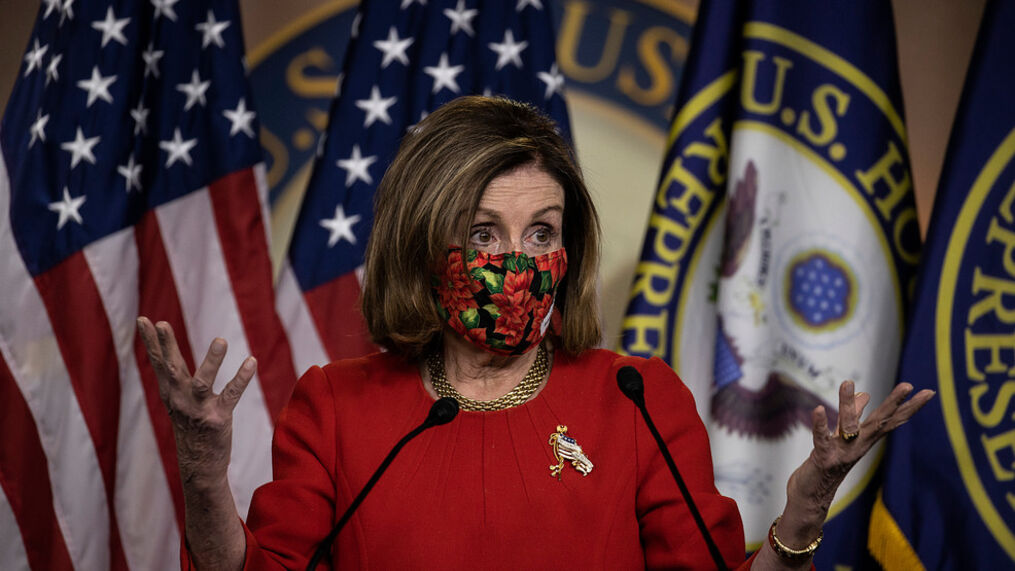
Latinx dems are among legislators pushing for $2,000 stimulus checks with CASH Act
On Dec. 28, the House is voting on the Caring for Americans With Supplemental Help (CASH) Act, which seeks to increase the $600 direct stimulus payment checks in the bill just signed by President Donald Trump, to $2,000. It’s a move that follows the president’s own demands from Congress.
The vote challenges Republicans Party unity, to either approve the sum or defy Trump.
Introduced by Ways and Means Committee Chairman Richard E. Neal (D-MA), Speaker Nancy Pelosi and her caucus brought the CASH Act to the floor last week, in a motion to pass it by unanimous consent. This of course failed, so now Dems are bringing the act back for a formal floor vote.
Along with increasing the stimulus direct-payment sum to $2,000, the CASH Act would apply the same eligibility standards established in the end-of-year package to mixed-status families, where one spouse has a Social Security Number (SSN).
As specified in the latest COVID relief legislation, these families are now eligible for direct payments for each family member with an SSN, and can claim the corresponding amount for the first round of economic impact payments when they file their 2020 taxes.
The increase has sizable support from members of both parties, but it’s already projected to be difficult to pass, especially considering those opposed the extra billions it would take to distribute the funds.
The original $600 payment will cost $164 billion, with the Covid-relief package estimated at $900 billion. Overall, the total package is projected at $2.3 trillion.
To increase the checks to $2,000 would cost over $460 billion.
“That’s okay with me,” says Rep. Alexandria Ocasio Cortez (AOC).
The progressive representative from New York juxtaposed the situation with the perceived hypocrisy exhibited by conservatives.
“Alternatively, if conservatives are suddenly so concerned w/ the cost of the bill, maybe they should focus on stripping their cushy tax giveaways for 3 martini lunches and thoroughbred racehorses instead of blocking critical support for working people,” she wrote on Twitter
CONTENIDO RELACIONADO
That’s okay with me.
— Alexandria Ocasio-Cortez (@AOC) December 28, 2020
Alternatively, if conservatives are suddenly so concerned w/ the cost of the bill, maybe they should focus on stripping their cushy tax giveaways for 3 martini lunches and thoroughbred racehorses instead of blocking critical support for working people. https://t.co/UK3a8lanGm
Ocasio-Cortez herself introduced an amendment with Rep. Rashida Tlalib (D-MI) to increase the stimulus amount to $2,000.
Rep. AOC’s words were echoed by other members from the Congressional Hispanic Caucus. For months, its members have been raising alarms of the disproportionate effect the virus has had on Latinx and underserved communities across the nation.
For many, this aid is desperately needed for their constituents.
“A $600 check is not enough. I represent one of the hardest impacted districts in the nation and they’re counting on us to get this right. This shouldn’t be a partisan issue. We need to do the right thing and pass the #CASHAct,” wrote Rep. Vicente Gonzalez (D-TX) on Twitter, referencing Texas’ 15th district.
A $600 check is not enough. I represent one of the hardest impacted districts in the nation and they’re counting on us to get this right. This shouldn’t be a partisan issue. We need to do the right thing and pass the #CASHAct. https://t.co/B9PwKR3qh7
— Rep. Vicente Gonzalez (@RepGonzalez) December 28, 2020
On the conservative side, there is support, but it is relatively weak.
For instance, Rep. Tom Reed (R-NY), the Problem Solvers Caucus co-chairman, said that he will vote in favor of $2,000 relief checks that President Trump has demanded.
But the showdown offers little substance, and its future in the Senate is uncertain. Only large-scale, bi-partisan support is expected to alter the relief package, one of the largest federal interventions of its kind.
What’s likely to happen is all eyes will turn to distribution, and getting the already-approved $600 to desperate families as evictions continue, and as the nation navigates the virus through the winter.










DEJE UN COMENTARIO:
¡Únete a la discusión! Deja un comentario.